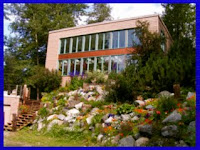06 02 11 Rediscovering Enjoyment
From my perspec tive the problem of permaculture is that it takes time to develop the plants and the land. This is especially true for us, because we had more than pure permaculture in mind. We are both allergic to cottonwoods, and our whole 1.9 acres is a cottonwood grove. Why not replace the cottonwoods with berries and fruit trees? We need some paths to go through the land, and especially we need stairs on the paths, because we live on the side of a mountain in the beautiful Chugach State Park of Alaska. We need a root cellar to store the food, and we need solar panels to reduce the amount of electricity we use generated from fossil fuels. The list of jobs can get long.
tive the problem of permaculture is that it takes time to develop the plants and the land. This is especially true for us, because we had more than pure permaculture in mind. We are both allergic to cottonwoods, and our whole 1.9 acres is a cottonwood grove. Why not replace the cottonwoods with berries and fruit trees? We need some paths to go through the land, and especially we need stairs on the paths, because we live on the side of a mountain in the beautiful Chugach State Park of Alaska. We need a root cellar to store the food, and we need solar panels to reduce the amount of electricity we use generated from fossil fuels. The list of jobs can get long.
This was aggravated by the fact that moving into the bioshelter was a decision designed primarily to serve Cindee’s sense of purpose in the world. Her main mission is to influence the world in such a way that allows for more sustainable life. No wonder she is so attracted to permaculture, it dovetails perfectly with the deepest desires of her life. Further, since she only works part-time she enjoys the freedom of time and energy to develop more and more plans for developing our land and for turning the bioshelter into an educational center (AlaskanEcoescapeEdu).
For my part, my calling is to serve the Presbyterian Church (my job title is executive presbyter for the Presbytery of Yukon)—a job that requires a lot of travel, and much of my energy. Joining Cindee in her dream has sometimes seemed exhausting. After a while, all I could see when I came home from my day job was a huge set of evening jobs waiting for me. Pretty depressing.
Of course I am not the only one in the world, who can get caught in too much work. The world is filled with people whose financial situation basically makes them slaves to minimal wage jobs. Some are trapped by huge medical bills, upside down mortgages, high pressure careers, or the sheer poverty that reduces them to mere labor machines. All of this, obviously, is the opposite of permaculture, which is about living in harmony with one’s environment rather than working too hard.
How did the people of our world end up in such an oppressive, work-frenzied culture? There has to be a better way.
My own spiritual roots tell me that there is, indeed, a better way. According to the first biblical creation story (Genesis 1:1-2:4) the pinnacle of creation is not the work, but the Sabbath. In this account, the whole of God’s work is about building a dynamic and complex, multi-relational created order, all of which exists because of God and for the purpose of being in relationship to God. The Sabbath is about God stopping and enjoying simply being in relationship with the whole created order, and with each of its creatures. The pinnacle of creation, according to my faith tradition, is not work, but is taking time to just be—to be in relationship with God and with all creation—and to enjoy.
What a difference this insight makes in my life, so long as I take time to remember it. I now try to start my day, first in prayer (taking care of my relationship with God, and allowing God to care for me), and second sitting with my wife in the solarium, surrounded by its wetland creatures and the view out the windows. It is a wonderful routine for restoring proper perspective.
Actually, the permaculture ideal is to make a 30-year plan for developing life where one lives. The idea is not to work oneself to death, but to live a life that builds life for future generations. In the meantime, one can enjoy the work, because it doesn’t have to be done today (or even in one generation). Today’s work is enough for itself.
If, as my spiritual tradition teaches, life is about enjoying existence in harmony with God and the created order, why do we (I) strive so hard for and against so much? How can we humans regain the life-lessons embedded in the Sabbath? And how can we begin structuring society to work like a permaculture garden, where everyone’s work is about everyone thriving, and where even work is in service of the Sabbath?
For now, I sit in the solarium surrounded by nature, and enjoy coffee with Cindee. It is a beginning.




What a great husband of 30 years I have! I especially love how perfectly you explain what we are doing here. I love you! :-)
ReplyDeleteCurt, this is great! As a Christian, I want to consider this perspective, especially being a conservative (Sh! Don't tell Cindee!) Conservative, and conservation come from the same root, right? And, God made us humans to be stewards of the earth, not rapers and pillagers!
ReplyDeleteI have been interested in permaculture ever since I heard of it. It seems so right -- not to mention fun and satisfying (and a lot of work). Next time I am up in your neck of the woods, I would love to visit.